From where I’m standing Seven accounts of the pandemic from the eye of the storm
18 December 2020
Earlier this month the Empathy Museum launched a new photography and audio installation, supported by the Health Foundation and the NHS.
From Where I'm Standing is made up of 34 stories of people’s personal experiences of the pandemic, including many who work in health and social care. Each of these storytellers shares their wisdom, kindness, hopes and fears in this unique portrait of life during the pandemic.
We’ve selected seven accounts that show the range of experiences people working in health and social care have been dealing with over the difficult months of 2020. From an Imam working in the Nightingale hospital in London, to a mental health nurse in Portsmouth, and an intensive care consultant in Manchester – all talk about how they’ve had to adapt their role and deal with the emotional impact of working in the eye of the storm during a pandemic.
Will
Will Hunter is a junior doctor working in A&E in the south of England. He lost a colleague to COVID-19 and explains the wave of shock that came with not being able to comfort colleagues with a hug because it wasn’t safe to do so. Will was struck by the disproportionate impact of COVID-19 on black and minority ethnic people, at the same time as the Black Lives Matter protests were taking place around the world. He describes his own experience of being stopped by the police while simply driving to work.
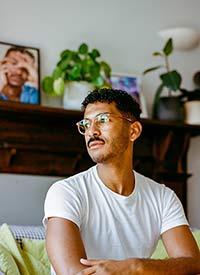
Grace
Grace Nabus is a senior nurse at the Royal Hospital Chelsea in London where she has worked for 14 years. Many of the Chelsea pensioners live independently in the grounds of the hospital and Grace talks about the sense of community reminding her of the Filipino community, where everyone greets one another. Grace has a respiratory condition and talks about the fears her family had for her and the anxiety felt by staff at the start of the pandemic when PPE was in short supply. Ten Chelsea pensioners have died this year from COVID-19.
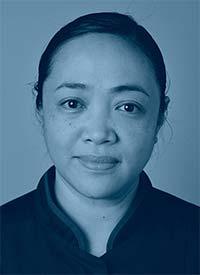
Brendan
Brendan McGrath is an anaesthetic consultant in Manchester. When the pandemic struck, he moved to working full-time in an intensive care unit. Brendan explains the relentlessness of people being admitted with COVID-19 and the intensity of providing care in full PPE. He also describes the experience of being with patients when they can first speak again after being on a ventilator, and the innovative work he has done around tracheostomies that’s supporting patients to be able to speak sooner. Home was an important refuge for Brendan and he tried to find a few minutes each day to play guitar.
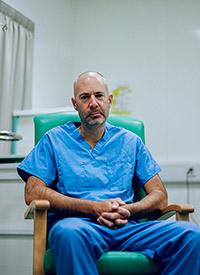
Yunus
Imam Yunus Dudwhala is the head of chaplaincy at Barts Health NHS Trust in London and helped organise the chaplaincy and bereavement services for the Nightingale Hospital in the Excel Centre. Yunus contracted COVID-19 and had to isolate at home. During that time, he was asked to provide support to a family and describes how he connected with them remotely, praying with them online from his home. Yunus also explains the rituals of washing and shrouding the deceased. He spoke to virologists about how to continue to do this safely and provided training for other Imams.
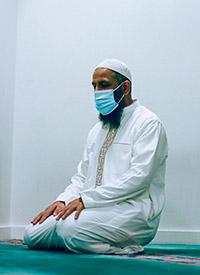
Francella
Francella Miles has worked as a cleaner at Northwick Park Hospital for 22 years. She explains how she greets all the patients, smiling and talking to them. Francella remembers the lead-up to the pandemic; knowing the virus was coming, preparing for it, and then patients arriving, sick with COVID-19. She explains the strength and inspiration she takes from the Bible and how it helps her to keep showing up for her team, and going to work in the High Dependency Unit. Francella was given an award for her work.
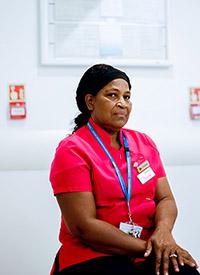
Dean
Dean Williams is a mental health nurse from Portsmouth, working in liaison psychiatry. He talks about the impact that living through a pandemic is having on people’s mental health, particularly the increased isolation and ongoing stress everyone is experiencing. Referrals really dropped during the first lockdown as people stayed home and didn't ask for help. The main worry was that people with nowhere to turn to would take their own lives. Now, he says, the team is seeing what feels like more professionals walk into the emergency department, including health and social care staff with no history of mental health problems prior to COVID-19. There’s also been an increase in the number of people experiencing very severe psychotic symptoms.
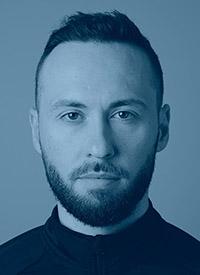
Geraldine
Geraldine Cunningham works at Barts Health NHS Trust as associate director of culture change and was redeployed during the pandemic as the trust’s lead for staff support and wellbeing. She describes the outpouring of generosity from the local community, particularly in the early days when the hospitals were receiving deliveries of food and gifts for staff. Geraldine also explains that the trust realised they should be prioritising improving facilities for staff and providing psychological support and how the context of COVID-19 has enabled some of that vital work to happen.
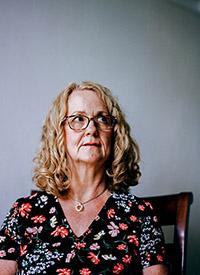
Explore the full installation to experience all 34 stories.
This content originally featured in our email newsletter, which explores perspectives and expert opinion on a different health or health care topic each month.
Also in this newsletter
Work with us
We look for talented and passionate individuals as everyone at the Health Foundation has an important role to play.
View current vacanciesThe Q community
Q is an initiative connecting people with improvement expertise across the UK.
Find out more

